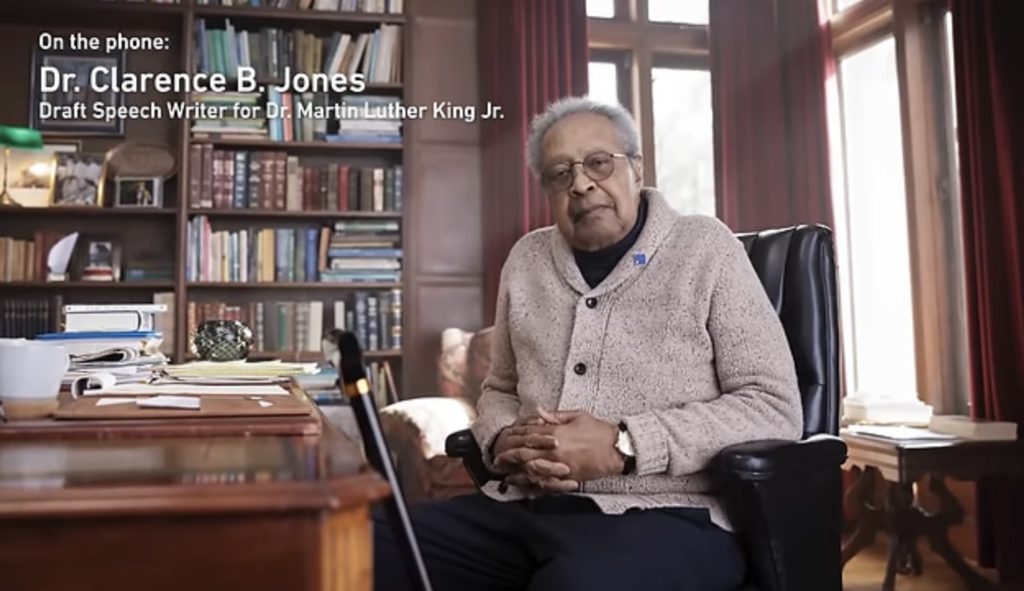
Civil rights activist Dr. Clarence B. Jones delivered his first major speech as the Palmyra High School Class of 1949 valedictorian, urging his fellow students to reach for their dreams.
In 1963, he wrote some of the most famous words in history, from the “I Have a Dream” speech by Dr. Martin Luther King Jr. on the steps of the Lincoln Memorial during the march on Washington in the nation’s capital.
“I have a dream that my four children will one day live in a nation where they will not be judged by the color of their skin, but by the content of their character,” he thundered.
Jones delivered another speech on Super Bowl Sunday, during a 30-second ad that was seen by millions.
“All hate thrives on one thing: silence,” Jones said. “We stand up to all hate. The people who will change the nation are those who speak out against injustice and refuse to be bystanders, who raise their voices against injustice.”
At 93 years young, Jones has fought that injustice his entire adult life and continues to talk about his experiences and answer questions during speeches around the country, including at Camden County College in Blackwood last September.
The ad that featured Jones aired early in the NFL champonship game and was paid for by the Foundation to Combat Antisemitism (FCAS), an organization founded by Robert Kraft, owner of the New England Patriots. It showed examples of hatred against Jews by the Nazis and in the present day, but also Muslims, Palestinians and others in America.
“The work Dr. Jones has done over the course of his entire life and career is the embodiment of FCAS’ mission to build bridges and stand up to Jewish hate and all forms of hate,” Kraft told TV viewers. “In the time we have spent together and through his work, I have become a huge fan of Dr. Jones, and I am proud to spotlight all that he has done for our nation.
“With this ad, we hope to continue to spread Dr. Martin Luther King Jr.’s message of unity and equality at a time in which the country needs it most,” he added, “and our goal is to reach a wide audience of people and inspire all Americans to stand up together, arm in arm, and fight this horrific rising hate.”
“We couldn’t think of a better voice than Dr. Clarence B. Jones’ to stand out at a time where hate in the United States is occurring at overwhelmingly high rates,” observed Will Campbell, CEO of Quantasy, the Black- and Asian-owned ad agency that produced the commercial.
The amazing life of Dr. Jones began at 2109 Hunter St. in East Riverton. His parents bought the home while they worked as a butler and maid in the home of Edgar and Eleonora Lippincott at 806 Main St., also in Riverton.
During his speech at Camden County College, Jones recalled that his parents wanted him to get a good education and sent him to a boarding school in Philadelphia at age 6, an experience “that defined who I am,” he pointed out. Every day until he was 14, the Irish Catholic nuns there told him, “Be a good boy. We love you. Jesus loves you. You are beautiful.”
“That implanted the sense that I am somebody deep into my spine,” Jones remembered.
When he returned home and attended Palmyra High, the school was 70% white. Still, Jones was voted president of the honor society and most likely to succeed by his peers. After high school, he went on to graduate from Columbia College and earned his law degree from Boston University. He moved to California and became a copyright attorney, helping songwriters who claimed their music was stolen by other artists.
One day, a friend asked him to help King fight a tax evasion charge filed by the state of Alabama in 1960. Jones wondered why he should help King “just because he got his hand stuck in the candy jar.”
Then the civil rights leader came to his door.
“I turned him down,” Jones noted. “Then he asked me to come hear him speak at the largest Baptist Church in Los Angeles. It was like the Black version of Beverly Hills. I was mesmerized. What does this Baptist preacher know about the Magna Carta,” thought Jones, who said King then changed a poem by Langston Hughes and “put the words in my mother’s mouth.
“I started crying,” he recalled. “After the service, I said, ‘Dr. King, when do you want me to go to Montgomery?'”
From then on, the two men became great friends and movement leaders. While working with the Southern Christian Leadership Conference (SCLC) to mobilize large, non-violent protests in places like Birmingham and Selma in Alabama, Jones learned that his father had died. He went back home for the funeral at Mt. Zion AME Church in Riverton.
Someone came into the church and said, “Dr. Jones, Martin Luther King Jr. is here and he wants to speak,'” Jones recounted. “I said, ‘He doesn’t know my father.'”
Yet, Dr. King did end up speaking at the funeral.
“I know my friend Brother Clarence is probably surprised that I am here,” King told the churchgoers. “I did not know the deceased, Goldsborough Benjamin Jones, but I know his son.”
“I was dumbfounded,” Jones told his audience at the college, as he wiped a tear away at the memory.
Jones’ journey in life has been a long one. But he continues to deliver a message of peace and non-violence – and a call to action for people to speak out against hatred.










